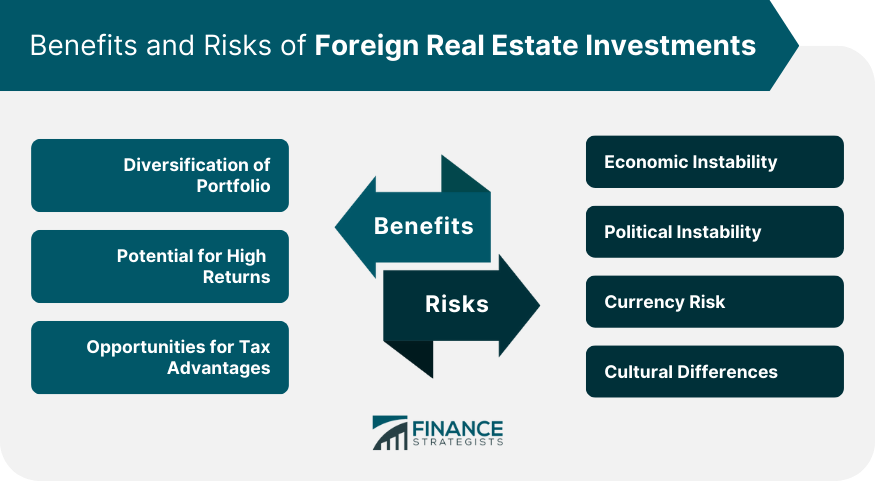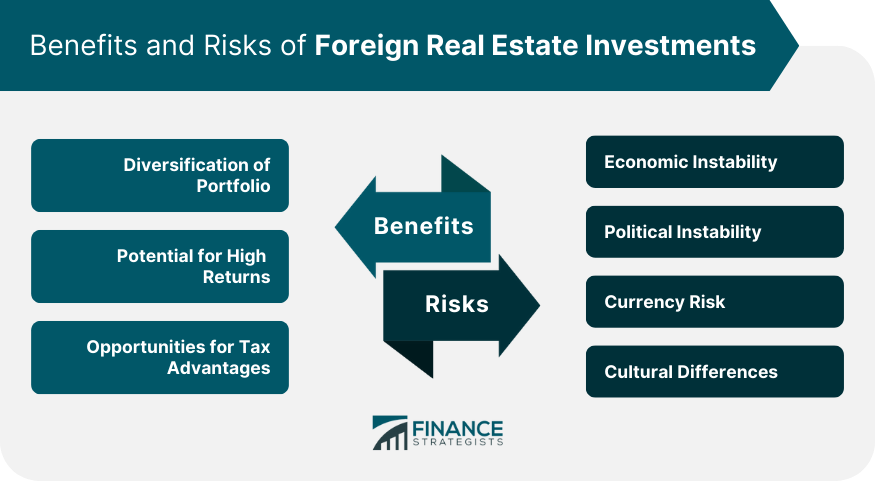Ever thought about owning a beachfront property in Bali or a quaint villa in Tuscany? Investing in international real estate opens up a world of opportunities, literally. It’s not just about owning a property abroad, but diversifying your investment portfolio.
Navigating international markets requires understanding local regulations and market trends. Historical data shows that foreign real estate investments can yield substantial returns, particularly in emerging markets. Moreover, currency fluctuations can also play a critical role in enhancing or diminishing your investment’s value.
- Identify your investment goals and budget.
- Research target markets, including economic stability and property laws.
- Consult with local real estate agents and legal advisors.
- Secure financing through international lenders or local banks.
- Conduct due diligence on property options.
- Proceed with the purchase and hire property management if needed.

Exploring the Benefits of International Real Estate Investment
Investing in international real estate can help diversify your portfolio. By owning properties in different countries, you spread out your risk. This means if one market dips, another might still be performing well.
Another benefit is potential tax advantages. Some countries offer incentives to foreign investors, reducing your overall tax burden. It’s important to research these benefits to maximize your returns.
Additionally, international properties can provide a steady income stream. Renting out properties to locals or tourists can generate significant rental income. This is especially attractive in popular tourist destinations.
Lastly, there’s the potential for capital appreciation. Properties in emerging markets can increase in value as the local economy grows. This can lead to substantial long-term gains for investors.
Understanding the Basics of International Real Estate Investment
International real estate investment involves buying property outside your home country. It’s different from domestic real estate because you’re dealing with different laws and market conditions. This requires a deeper understanding of global trends.
Investing abroad can be complex. You need to understand the local market and regulations. It often involves working with local experts to navigate these challenges.
One important factor is currency exchange rates. Fluctuations can impact the value of your investment. Staying updated with currency trends is crucial.
Additionally, managing property from afar can be challenging. Hiring a property management company can help. These firms handle day-to-day operations, making it easier for you.
Researching Local Markets
Before investing, it’s vital to research local markets. You’ll want to understand the economic conditions and property values. This helps you make informed decisions.
Analyze local employment rates and population growth. These indicators can reveal potential growth areas. Look for regions with positive economic trends.
Seeking advice from local real estate experts can also be beneficial. They have insights into market conditions that you might miss. Their guidance can help navigate local nuances effectively.
Legal and Regulatory Considerations
Each country has its own set of property laws. Understanding these is crucial before making any investment. You don’t want to encounter legal issues down the road.
Some countries may have restrictions on foreign ownership. Knowing these rules helps you avoid problems. Being aware of tax obligations and incentives is also important.
Consulting with a legal expert in the country can provide clarity. They can help you understand the legal landscape. This ensures you follow all necessary regulations.
Managing International Properties
Managing properties from afar requires careful planning. Hiring a reliable property management company is often the best solution. These professionals take care of maintenance and tenant issues.
Regular communication with your property manager is key. It helps keep you informed about the condition of your investment. Frequent updates can prevent any surprises.
Using technology can also make management easier. Property management software can offer real-time updates and analytics. This simplifies overseeing your investment remotely.
Choosing an Ideal Location
Picking the right location is crucial for international real estate investment. When a place has political stability, it’s usually safer for investments. This minimizes the risks involved.
Economic conditions play a significant role. Look for regions with a growing economy and job opportunities. A healthy economy attracts tenants and buyers.
The local culture and demand for the property type matter too. Areas popular with tourists are often good for vacation rentals. Cities with universities might be ideal for renting to students.
Also, consider the infrastructure and amenities. Locations with good roads, schools, and hospitals are more attractive. These factors can increase the value and rental potential of your property.
Researching International Property Laws and Regulations
When investing abroad, understanding local property laws is essential. Different countries have unique rules on property ownership. For instance, some places restrict foreign ownership.
Taxation is another important area to research. Each country has its own tax laws for property transactions. Knowing these can help you avoid unexpected costs.
Additionally, be aware of regulations about renting properties. Some countries have strict tenant laws. This can affect how you manage and rent out your property.
It’s also crucial to understand the legal process for buying property. This might include hiring a local lawyer. They can help you navigate the complexities.
Compliance with local building codes and zoning laws is vital, too. These regulations influence what you can do with your property. Violating them could lead to fines or other penalties.
Finally, consult with local real estate experts and legal advisors. They offer valuable insights into the local legal landscape. Their guidance can be instrumental in making informed decisions.
Evaluating International Real Estate Market Trends
Monitoring market trends is crucial for successful investment. Knowing when to buy and sell can maximize your returns. Keep an eye on economic factors like GDP growth and employment rates.
Property demands also fluctuate with market cycles. During economic booms, property values usually rise. In recessionary periods, however, prices might drop.
Another key indicator is population growth. Areas with increasing populations often have higher property demands. Look for countries with positive demographic trends.
Pay attention to foreign investment inflows as well. Rising foreign investments can signal a strong market. Countries opening up to foreign investments often see property values increase.
Technological advancements and infrastructure developments play roles too. New technology or improved infrastructure can make areas more attractive. This can lead to an appreciation in property values.
Lastly, consult reports from international real estate agencies. These provide detailed insights into various markets. Such information can be invaluable in making informed investment decisions.
Financing International Real Estate Investments
Finding the right financing is crucial for international real estate investments. Mortgage options vary by country. Some nations offer loans to foreign investors, while others don’t.
Consider using different sources for financing. Personal savings, foreign mortgages, and international lenders are common options. Each has its own pros and cons.
Exchange rates play a significant role in financing. Fluctuating rates can affect your loan repayments. Understanding current exchange rates helps in planning your finances.
Research local banks and their requirements. Some banks might require a higher down payment from foreign investors. Knowing this in advance helps in preparing your finances.
Think about the overall cost of the investment. Include not just the property price but also taxes, insurance, and maintenance costs. A complete financial plan is essential for success.
Lastly, consulting with financial advisors can be beneficial. They offer insights into the best financing options and strategies. This can simplify the complex process of international investment.
Working with Local Real Estate Agents and Consultancies
Partnering with local real estate agents can simplify your investment journey. They offer valuable insights into the local market. This expertise helps you make informed decisions.
Local agents understand the nuances of neighborhoods. They can identify the best areas for investment. This saves you time and ensures a better return on investment.
Consultancies provide specialized services beyond just buying property. They assist in legal matters, property management, and even financing options. Their comprehensive support can be invaluable.
Meeting language barrier challenges is easier with local experts. They facilitate smoother communication with sellers and other stakeholders. This eliminates misunderstandings and speeds up processes.
If you’re unfamiliar with local regulations, consultancies offer essential guidance. These professionals ensure you comply with all required laws and procedures. Avoiding legal pitfalls protects your investment.
Lastly, building long-term relationships with these experts can lead to future opportunities. Leveraging their networks opens doors to more lucrative investments down the line. This partnership benefits both parties significantly.
Managing International Property Investments
Managing an international property can be complex but rewarding. Hiring a local property management company is often crucial. They handle day-to-day operations, making your job easier.
Technology can be your best friend. Utilize property management software to streamline tasks. This can provide real-time updates and analytics on your investments.
Regular communication is key. Stay in touch with your property managers to stay informed. Frequent updates prevent surprises and help in making timely decisions.
Consider visiting the property periodically. Physical inspections help you understand its condition. It’s also a good opportunity to meet with your local team.
Knowing local laws and regulations helps in effective management. Staying compliant avoids legal issues and penalties. Be aware of changes in property laws that could affect you.
Lastly, tenant relations are important. Happy tenants tend to stay longer, reducing vacancy rates. A good property manager ensures tenant satisfaction, benefiting your investment.
Frequently Asked Questions
International real estate investment can be complex and challenging. Here are some common questions to help guide your journey.
1. What are the risks involved in international real estate investment?
The risks include fluctuating currency rates, political instability, and different legal systems. Unfamiliarity with the local market conditions can also pose challenges.
Additionally, managing properties from a distance can be tricky. Hiring local experts and staying informed about local regulations can mitigate these risks.
2. How do I choose a reliable local real estate agent?
Start by looking for agents who have extensive experience in the local market. Check their credentials and client reviews to ensure reliability.
A good agent should provide you with market insights and help navigate legal requirements. Personal referrals or recommendations can also be valuable resources.
3. Are there tax benefits when investing in international real estate?
Yes, many countries offer tax incentives for foreign investors. These benefits might include reduced property taxes or exemptions on capital gains tax.
It’s essential to consult with a tax advisor familiar with international regulations. This ensures you maximize the available benefits while staying compliant with laws.
4. What should I look for in an emerging market?
An emerging market typically shows signs of economic growth and increasing population. Look for improvements in infrastructure, such as roads and utilities.
Sectors like tourism or technology often drive growth in these markets. Regularly monitoring economic indicators can guide your investment decisions effectively.
5. Is it possible to get financing for international properties?
Yes, many global banks offer loans specifically for purchasing international properties. Local lenders in the country where you’re buying may have more favorable terms.
You will need to compare interest rates, loan terms, and eligibility requirements carefully. Consulting with financial advisors can help you find the best options available.
Final Thoughts on Investing in International Real Estate
Investing in international real estate offers a range of opportunities and unique challenges. By understanding market trends and local regulations, you can make informed decisions. This approach minimizes risks and maximizes returns.
Professional guidance is invaluable in this field. Consulting with local agents and financial advisors can simplify the process. With the right strategy, international real estate can be a lucrative addition to your investment portfolio.

